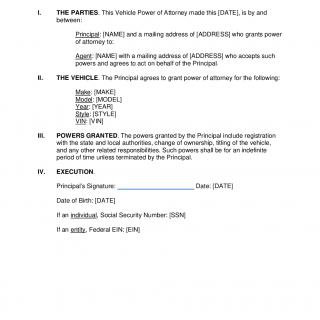Vehicle Power of Attorney
A Vehicle Power of Attorney is a legal document that gives one person (the agent or attorney-in-fact) the power to act on behalf of another person (the principal) in matters related to the principal's vehicle(s). This form typically comprises several sections, including:
1. Identification of the parties: The Vehicle Power of Attorney will typically begin by identifying the parties involved, including the principal, the agent, and any witnesses who may be required to sign the document.
2. Powers granted to the agent: This section will describe in detail the powers that the principal is granting to the agent with regards to their vehicle, such as transferring ownership, registering the vehicle with the DMV, negotiating sale of the vehicle, and signing documents related to financing or leasing.
3. Limitations on the agent's powers: This section will outline any limitations or restrictions on the agent's powers, such as restrictions on specific types of transactions or limitations on the duration of the power of attorney.
4. Vehicle details: This section will include detailed information about the vehicle(s) such as the make, model, year, VIN number, and license plate number.
5. Termination provisions: The Vehicle Power of Attorney will typically include provisions outlining when and how the power of attorney can be revoked and any conditions under which it will automatically terminate.
A Vehicle Power of Attorney can be drawn up in several cases, such as when the principal requires the agent to perform certain vehicle-related tasks on their behalf, such as selling or registering the vehicle. In such cases, the parties involved in this form are the principal and the agent.
When compiling this form, it is important to consider the scope of authority that is being given to the agent and any limitations or restrictions that should be placed on that authority. Specific language and details should be included in order to ensure that the document accurately reflects the wishes of the principal. It's also important to work with an attorney or experienced legal professional to help ensure the document is appropriately created and meets all legal requirements.
There are advantages to using a Vehicle Power of Attorney. It can provide peace of mind to the principal, knowing that their vehicle affairs are being handled by someone they trust. It can also make completing certain tasks more efficient, such as transferring ownership or state registration. However, there can be problems if the form is filled out incorrectly, such as granting too much authority to the agent or failing to include necessary details or language. It is important to thoroughly understand the content of the Vehicle Power of Attorney before signing it, and to work with a qualified legal professional to ensure that the document is legally valid and appropriate to the principal's needs.

